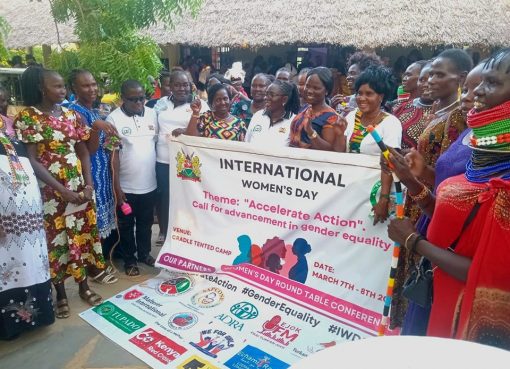The government through the Ministry of Education has assured Kenyans that it will make Technical Vocational Education and Training both accessible and affordable to the Kenyan youth to enable them acquire competent technical skills that will enable them emerge as employers not job seekers after graduation.
Education Cabinet Secretary Ezekiel Machogu has said that his ministry rolled out the Competency Based Education and Training (CBET) in September this year to ensure the trainees acquire competent skills that suit industry requirements.
He hinted that, through Dual Training where trainees learn 70 percent at the industry and 30 percent at the classroom setting will boost their competency through the learner centred approach and hence be able to solve the problem of unemployment in the society.
The CS was speaking when he presided over the 18th Graduation Ceremony for The Eldoret National Polytechnic, where 2692 grandaunts graduated.
He commended the National Polytechnic for its significant step of enrolling 2,886 trainees in 103 Competence Based Education and Training (CBET) courses in September and also offering over 30 other qualifications developed by the institution.
Mr Machogu reaffirmed the Governments’ commitment to make TVET both accessible and affordable to the Kenyan youths through the recently launched New Funding Model (NFM) adding that the initiative will give Kenyan youths an opportunity to be skilled at the TVET institutions.
“The Government ruled out the old higher education funding model which was not sustainable that was generally known as Differentiated Unit Cost where each and every one of us was being funded even if a child belonged to a financially able family hence disadvantaged the one from a needy family,” explained the CS.
The CS noted that the Government will continue to make this funding available to Kenyan youths who aspire to join public TVET institutions as TVET institutions are encouraged to broaden their revenue streams to further boost their liquidity.
He mentioned that the TVET sector remains a significant area of concern for the current Administration which envisions a state in which every individual is engaged in rolling the wheel of development, as reforms in this sector will ensure efficiency, quality, and relevance of the skills offered.
Machogu indicated that continuous engagement between the TVET sector and industry is crucial in addressing a substantial gap between the skill sets taught by the educational institutions and those demanded by industry.
“Such synergy is crucial if we are to produce highly qualified human resources; therefore, no resource should be spared in establishing linkages and networking between industry players and TVET stakeholders,” he said.
He lauded the graduates of middle-level colleges for being the movers and shakers of the Kenyan economy as most sectors of the economy are manned by great Kenyans with TVET skills and knowledge.
The CS added that the Ministry of Education will continue to ensure that service providers in the TVET sector not only conform to stipulated standards, but also ensure that training offered is both competitive and of high standard.
“TVET Authority (TVETA) is mandated to regulate the sector through accreditation of TVET institutions and licensing Trainers with a view to ensuring that our training meets the required standards,” he noted.
Noting that the National Polytechnic and the Kenya National Qualifications Authority KNQA have rolled out the Recognition of Prior Learning (RPL), the CS urged all those with skills but not certified to take advantage of this initiative in the National Polytechnics for RPL assessment and certification.
“The Ministry of Education shall ensure that Recognition of Prior Learning (RPL) takes root in all qualification awarding institutions as an alternative certification path,” said Machogu.
The Education CS revealed that the Government recently recruited and deployed 1,300 TVET trainers to different TVET institutions countrywide and will soon be embarking on the second phase of recruiting 2,000 trainers. This move will ensure that all TVETs have enough qualified trainers to run their programmes.
He added that the current trainers are being re-tooled to effectively deliver Competency Based Education and Training (CBET) to ensure trainees have relevant practical competencies and skills aligned to the needs of the industry.
“I am confident that implementation of this model will make TVET graduates competitive in the labour market and at the same time ease the transition between education and employment,” he noted.
Mr Machogu further noted that the Government has equipped TVET institutions with modern equipment in order to enhance quality of TVET training noting that the institutions that had not received equipment have been ear-marked to receive theirs soon.
“The Government has continued to ensure that there is infrastructure development in all TVET institutions countrywide. Currently, the number of TVCs stands at 238 and construction of the remaining 52 will be done in phases. Construction of TVETs in 16 constituencies will commence in this financial year,” alluded the CS.
He challenged the graduates to utilise the competencies and skills acquired as well as the opportunities available in alleviating the numerous challenges currently afflicting society.
The CS urged them to occupy their positions in the development of the nation, thereby making a substantial impact on the country’s economy.
“Graduants, it is imperative that you make a meaningful impact to the world and contribute to your country’s pursuit of achieving developed nation status,” he said.
By Ekuwam Sylvester and Judy Too





